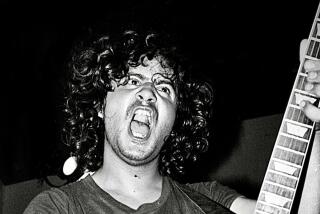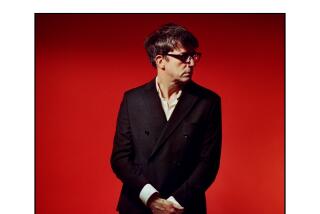Invasion in Reverse
LONDON — There was a sign outside British music’s front door last summer. It read “Situation Vacant” and, in smaller print, “Wanted: the Next Big Thing.”
The land of the Beatles was getting desperate for a new band to prove that the nation’s musical wellspring hadn’t completely run dry.
Sure, we liked our Dido and David Gray, our Coldplay and Craig David. They’re all very ... nice. But what we craved was rock ‘n’ roll that stirred the heart and soul.
We hadn’t had much of it since Britpop and Oasis erupted in the mid-’90s. So it seems that some seismic emotional shift occurred whereby the U.K. tacitly decided that if it couldn’t produce any decent rock bands itself, it would adopt a few.
That may be why we went a bit barmy over two then-unknown American bands, the Strokes and the White Stripes, plus one Swedish combo, the Hives.
The White Stripes hadn’t been heard in the U.K. before they paid their own fares over to make a modest debut on July 26 at the 100 Club, a London cellar. Yet, 13 nights later, after a live session on BBC Radio 1 and ecstatic music press reaction, when they delivered their fiery punk-blues at the even smaller Boston Arms pub, suddenly they were national news.
Tabloid show-biz correspondents--dedicated followers of celebrities, not indie bands--jostled their way in. Next day, the 3-million circulation Mirror unwittingly aped a notorious early review of Bruce Springsteen when the headline on its full-page White Stripes feature inquired, “Is this the future of rock ‘n’ roll?”
One certain answer was that the U.K.’s music industry, fans and media fellow travelers fervently hoped so. The White Stripes went on to sell 120,000 of “White Blood Cells” (their third album but the first released in the U.K.).
That almost made the Strokes’ British breakthrough look laggardly. Their first U.K. gig, in January 2001, took place at the quaintly obscure Wedgewood Rooms in Portsmouth. With no record released here, they opened for ... And You Will Know Us by the Trail of Dead (whom the wider British public has yet to discover). But six months later, they were media darlings, selling out 1,500-seaters and eventually selling 400,000 copies of their debut album.
Shortly after, the Ramones-like Hives benefited from getting a couple of their overwrought performances on TV. Their “Your New Favourite Band” album took off toward 100,000 sales, the gold mark in U.K.
Why did these groups sweep us away?
Classic virtues. That’s the best answer. Hard, short songs. Tunes. They roar along, fast and strong. Live, they give everything. They enjoy a bit of self-mythologizing and they are committed to style.
In sum, they are characters, not cardboard cutouts.
There again, when it comes to giving our heart and soul, we have our hesitations. For one thing, naturally we really wish they were Brits. For another, between bursts of euphoria, we wonder if they’re for real or some kind of mirage conjured up by desperation.
But these doubts are unlovely. U.K. rock could do with a leap of faith to traverse the present slough of stultifying, manufactured tone typical of so much recent commercial pop.
We may be encouraged by the words of one of the ultra-smart rock ‘n’ rollers in whom we vest our best hopes for an uplifting future, perhaps with some inspiration to spare for the home-grown talent.
Consider the self-assessment of Hives guitarist Nicholaus Arson: “We have always thought we were better than we were. But now we’re as good as we think we are. Although, maybe we aren’t.”
*
Phil Sutcliffe is a London-based writer and a contributing editor to Q magazine.
More to Read
The biggest entertainment stories
Get our big stories about Hollywood, film, television, music, arts, culture and more right in your inbox as soon as they publish.
You may occasionally receive promotional content from the Los Angeles Times.










